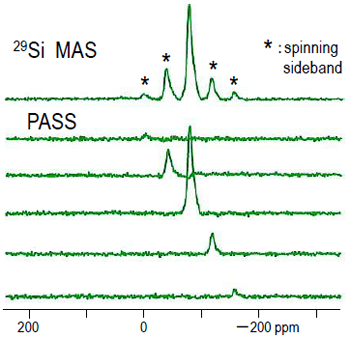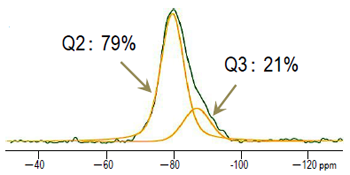Quantitative NMR Using Large-volume 8mm MAS Probe:PASS Technique Overcomes Sample-spinning Limitation
NM140008E
Large-volume 8mm MAS probes yield the world-class sensitivity. On the other hand, their sample-spinning speed is confined to relatively slow one, raising spinning sidebands (SSBs) depending on nuclear species and samples. Accordingly, the center band intensity becomes comparatively low, and quantitative capability of the spectra may be lost, as well.
However, PASS (Phase Adjusted Spinning Sideband) technique retrieves the inherent peak by acquiring the individual SSBs and summing them up. The figure on the right demonstrates 29Si MAS and PASS spectra for a glass sample. Comparison of MAS, TOSS, and PASS spectra in the figure below proves that PASS recovers the inherent intensity.


PASS spectra do not split the center peak into SSBs so that quantitative capability is guaranteed. Site fraction, for example, can be determined via lineshape analysis.

Article giving more detailed description, “T. Nakai, New Glass, 28(2),17-28 (2013)” (in Japanese) is available. The request to sales or sales promotion team is highly appreciated.
The sample courtesy of
Asahi Glass Co., Ltd.
SEARCH APPLICATIONS
Related Products
Are you a medical professional or personnel engaged in medical care?
No
Please be reminded that these pages are not intended to provide the general public with information about the products.
